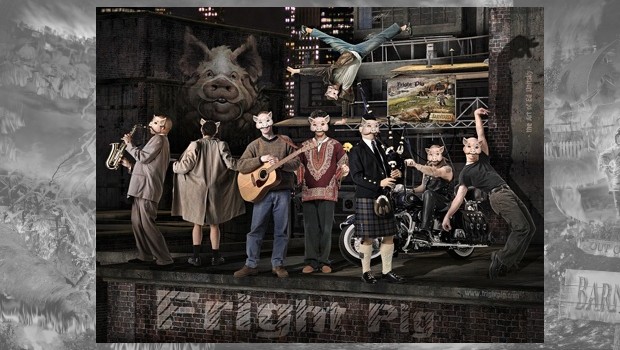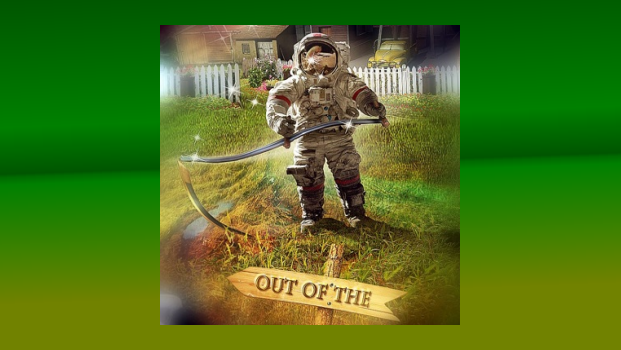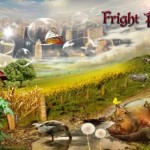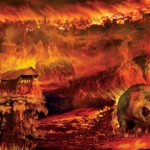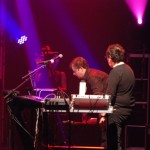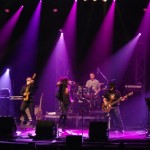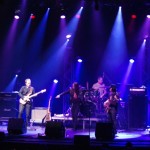 A mysterious entity in Prog
A mysterious entity in Prog
The project called “Fright Pig” is a fellowship of anonymity. The brilliant debut album “Out of Barnyard” was produced in 2013 under funny nicknames such as “Pig Maillion”, “Makon Baykon” etc. This nice digipack has gotten an impressive response from many prog fans, yet all of the virtuoso musicians have remained shrouded in mystery! Later in 2014, “Fright Pig” performed live at RoSfest, where a few tantalizing details about the band finally began to emerge. These are only a few of the reasons for me to ask “Someone behind the Pig’s image” about his personality and the album that I can only describe as “something in the vein of Main Horse by Patrick Moraz and Kansas but much heavier and really, very different ”. So, don’t be frightened: the project’s author is a real man, composer and keyboardist. His name is Josh Kirsch.
Olga Potekhina: Is there a source of inspiration that led to you creating “Out of the Barnyard”?
Josh Kirsch: I have always wanted to create a progressive album. It stretches back to when I was a teen and was turned on to progressive rock by some of my more enlightened friends. But the spark that ignited the idea actually came when I was finally able to buy some used analog synths! I was living in Manhattan and working as a studio assistant, barely able to make ends meet. I went to a friend’s wedding in Kentucky and happened upon the craziest music store out in the middle of nowhere. I remember that it had a bunch of Star Wars characters painted on the walls. Inside, they had a used music instrument department that was stuffed with every analog synth you could imagine! This was back in the early 90s, when analog synths were dirt cheap, years before their resurgence.
Olga: And you could afford to buy some?
Josh: Yeah, I bought 3 synths: a banged-up Korg MS-10, a Moog Memorymoog, and a Clavinet. Even though they were cheap, I still couldn’t afford to eat for the next month or so! Years passed and I only used them on occasion. They mostly just sat in a corner of the studio. Until one day when I finally fired them up and started playing. And as I was tweaking knobs and rattling off progressive riffs, I started laying the groundwork for “Out of the Barnyard”… I just didn’t know it yet!
Olga: Josh, can you reveal the story behind the making of the album? I know that it takes a great amount of time and effort!
Josh: The idea of Fright Pig and doing the album really came about during the MySpace era: what really inspired me was discovering how many progressive bands actually existed! So, I began writing the first song that was eventually heavily reworked and became “Darkest of Forms” with another composer named Bailey Math… mostly for fun. As the song progressed, I would post the days results on MySpace – it was cool to think that people all over the world could listen to a song as it was being developed and give their opinions in the space of a couple of hours. And the listeners loved participating in the process! So, I kept on going and kept on writing, actually for a period of 2 or 3 years. As I wrote individual parts, I would replace many of them with real musicians.
Olga: Oh, and can you finally reveal their names? (drum roll!)
Josh: For most of the blazing metal guitar and bass parts, I tapped into a guitarist named Derek Corzine. He’s phenomenal, a truly gifted player! I also used two other guitarists, Ben Wise and David Gennaro to add some different approaches and colors to the tracks. Both are very accomplished musicians and composers. And for vocals, I called up a long time friend, Kyle Gordon. We had worked together on advertising music projects for many years. Kyle has one of the most amazing voices I have ever heard, and I knew that I wanted to feature him on the album. It was an honor to work with all of these guys!
Olga: Please tell us about your music education as your keyboard performances on the album are very impressive – you cover such a broad range of techniques, from classical styles that remind me of Chopin to modern masters such as Jon Lord.
Josh: I started with classical piano lessons when I was a wee lad, probably around 6 or 7 years old. I always liked playing the faster stuff, especially when the teacher threw me something like Chopin (smile). I was never a stickler for proper technique so I would usually drive the teachers crazy, especially if I had to play something slow and precise. And they really didn’t like some of the improvisatory embellishments that I would add when I was bored.
Olga: But at the very least, classical stuff hones technical skill, correct?
Josh: Without a doubt! But, eventually, I fully rebelled and took a few years of modern jazz with a teacher that insisted on always using a Rhodes electric piano. The Rhodes has a nice weighted action that I enjoyed, so it was a fun period. I then bought my first synthesizer when I was in high school, a Roland JX-3P, which became my gateway to playing in a bunch of local bands in Oceanside, New York and in Queens. I continued my piano studies in college but suffered a pretty bad hand injury during that time. That sealed the deal on technique: my left hand was no longer capable of doing any keyboard gymnastics. So I switched to rock and just concentrated on synthesizers and my right hand! When I did graduate from Bennington College, my music degree was in jazz textural improvisation and electronic music. I guess that all of these different styles found a voice on the album.
Olga: They do! And how old were you when you were introduced to progressive rock music?
Josh: I was a teen in the 80s so I pretty much missed out on the classic period of progressive rock. I mean, they still played Pink Floyd, Yes, and Genesis on the radio occasionally and the only progressive rock that was regularly played on New York radio during that time was Rush. Luckily, I had friends with older siblings who were more then happy to fill in the gaps of my progressive musical education. I started getting into fusion a little bit, listening to Billy Cobham , Brian Auger, and early Spyro Gyra. But it was discovering ELP, Argent, Triumvirat, and Nektar that made me a true progressive convert! Even today, with so many fantastic groups and so much quality progressive music, I still refer back to those groups when I want to feel inspired.
Olga: Josh, let’s talk a little bit about progressive, Josh. The visual artist Ed Unitsky was a very early fan of yours during the MySpace era and he highly recommended that I take a listen to your music. Also many people were waiting for the albums release: as you’ve just explained, they could hear “the work in progress”. Was it difficult – to manage the pressure of such high expectations?
Josh: I must say that Ed’s opinion really struck a chord with me. When I first happened upon Ed Unitsky’s page and saw his breathtaking work, I knew that if I had the chance, I would love for him to create something for Fright Pig… that is, when I finally finished the album! I could clearly see a wry, mischievous side to his art. And it often touched upon surrealism, which was something I had hoped to convey with my concept. However, back then I had only completed a few rough tracks and had some very loose ideas of what I would do next. So, I definitely felt the pressure to up the ante and write material that exceeded my own expectations.
Olga: So, you were an independent musician who also felt beholden to the opinions and expectations of your audience?
Josh: It’s really funny: when you set a personal creative goal such as making an album, you already have to please yourself, which is a hard enough task. But when you start to factor in the expectations of your potential audience (especially when hearing praise from a luminary such as Ed), it adds a second layer of challenge and pressure. It’s when you start to realize that the music that you are composing will eventually transform from something entirely personal to an entity that hopefully will be critically listened to by a rather large worldwide audience. And if you’re not careful, that sort of thinking can drag you under.
Olga: Was there a “creative recipe” for this situation?
Josh: Personally, I found that the way to manage that sort of pressure was not to lose sight of why I was creating the album and Fright Pig in the first place! I felt that I had something musical to say and that not everyone would agree with the way that I said it. That’s just the way it goes with any creative endeavour, but that alone should never be a reason to stop doing it. So, my approach never did change. And I accepted the challenge to make an album that I would be proud of.
Olga: Meaning, “ to make the album with many styles, ideas, and parts”! Why pay so much attention to detail and such constant musical change? Josh, were you creating a “show” for the mind or were you concerned that the listener might become bored?
Josh: It’s a good question! I could have shaved a year or two off of the process by only developing one or two solid ideas to make a single track. It’s got a lot to do with the way I have approached composing over the years. I never was one to map things out through the end – I have always written when I was inspired. So if I sat down one day and just had a brainstorm, by the time I mapped it all out on my computer, selected the instruments, monkeyed with the tempo, and did the other 20 things to ensure a bulletproof writing experience, the inspiration would have just vaporized into a haze.
Olga: So, you need to have your ideas flow…without being held back by technology….
Josh: Yes! And strike while the iron is hot! I find that musical ideas are not always groove or hook driven. Sometimes they can be as insignificant as a short phrase or just a musical color by blending different instruments. So, most of the tracks on the album are a patchwork of small inspirations. And being that progressive music encourages unconventional musical forms, I could leave these inspirations pretty much intact and string them all together later on to form something cohesive. It’s not the quickest or easiest way to write things by far! Not everything fits together in the end and you have to revise and rewrite a lot of material. But you do wind up with intricate compositions that the listener can explore and rediscover with repeated plays. So it did become a “show” for the mind.
Olga: Interesting. Josh, did you find the prospect of pleasing your fans while not overloading them “frightening”?
Josh: I remember a good friend of mine saying that the album was not something he could play every day…because he had to maintain a level of intensive listening and he wasn’t always in the mood for that kind of commitment. The progressive music listener is a special breed because they do approach music with intent. They intend to critically listen, intend to dedicate time to music that frequently dances over the 30-minute mark. And often times, intend to wrap themselves in an album concept and listen to each track with a storyline in mind. I didn’t want my album to be boring to such multi-faceted listeners!
Olga: Is there a storyline connected to “Out of the Barnyard”? Like many people, I have always imagined that it had something to do with George Orwell’s “Animal Farm” or at the very least, “Animals” by Pink Floyd. Yet the artwork included in the booklet that accompanies the CD seems to indicate that there might be another concept. Care to elaborate?
Josh: It’s funny, I haven’t really talked to anyone about the true concept of the album because it always seemed that most people were satisfied enough with the music and humor of Fright Pig. There is a rather dark concept behind it all. And it has nothing to do with farm animals, George Orwell, or bacon! By the way, the storyline is only featured in the songs that are sung on the album and not the instrumentals. The fabulous Ed Unitsky artwork in the enclosed booklet shows a bunch of disconnected images that feature an old man. The album concept is his story, that of an old man who is lapsing into a final dreamlike state of madness and dementia.
Olga: Josh, I’m confused… and where is the Pig? Or is it all about the man’s “crazy” dreams?
Josh: The first song, “re: Creation” speaks of the “creation” or onset of madness, and also plays upon how such a fracturing of the mind leads to the “re-creation” of a person to others as well as himself. Ed captured this theme by showing the man surrounded by blossoming fractals and other flowing designs that border on geometrical patterns. In “The Meaning of Dreams”, the old man is somewhat addled and confused by his dreams and is having trouble separating them from the waking world. His thinking is disjointed and he often refers to another person who had dispensed advice. That other person is himself, back when he had his full faculty about him. In the end, he does recognize the difference between his dreaming and being awake. He has fought the demons and won… though the victory is only temporary as the madness continues to manifest inside him. Ed also brought this concept to life with dark demonic imagery, candles, and the form of the old man being pulled from his bed into his dark dream world… In general, it was a combination of many pieces of art to form an ethereal collage that represented the history of the man’s memories.
Olga: That’s why each track has a different musical style as well? I noticed something akin to a “key moment” in all of them: a vocal, perhaps. Or a “Spanish” acoustic guitar, or a distinct “Classical” style…
Josh: Yes, this concept is also followed musically. “re: Creation” was written in a neo-progressive style which has a traditional symphonic air about it. “The Meaning of Dreams” is less traditional but still holds on to a specific musical form. “Darkest of Forms” is entering metal territory and is more chaotic and rambling. And “The Claustrophobia of Time” is dreamy and psychedelic in the middle before the musical form completely falls apart into a discordant textural soup at the end. So, that’s the concept of the album!
Olga: What are your thoughts on sound engineering, recording, and mastering in this era of the home studio?
Josh: I’m fortunate to have spent a large part of my career working and composing in traditional recording studio situations. And a lot of what I had learned on the original equipment has seamlessly transferred over to the newer software-based digital audio workstations that every home studio seems to employ. After all, most of the software offered in the market today are emulations of original recording studio gear. They are usually very faithful sonically and have an increased functionality that we only could have dreamt of in the past. The composing and recording setup that I used for many years back in the day consisted of a large Solid State Logic 6000E console, an Otari MTR90II 24-track tape recorder, and racks of synth and studio gear. I wrote all of my compositions on a Synclavier system. A veritable king’s ransom worth of equipment! Fortunately almost all of it was provided to me by my employer. My studio now consists of a single rack of gear, an Apple MacBook Pro, and my synthesizers. And this compact system is much more flexible and powerful then my old traditional one was. So in many ways, the processes that I use now are much the same as they always were. I’m just operating in a digital environment instead of an analog one.
Olga: Your album sounds absolutely brilliant! Could you explain some of the processes that you underwent to achieve your results?
Josh: I wrote and recorded all of the tracks for the album using Apple Logic. I used a combination of real instruments and gear as well as digital plug-ins. I then began replacing many of the sequenced parts with real players. Once I had a decently balanced mix, I split it into parts or “stripes” for the formal mix with my engineer friend Pablo Arraya at his studio, The Audio Piranha Group. We spent weeks on each mix using a combination of Pro-Tools and analog outboard gear to get our desired results. I then mastered the album twice, first in a mostly digital environment with Luis Herrera at his studio, Masterhead Lab Mastering. I then did a second mix and mastering pass using mostly very high-end analog mastering gear with Doug Maxwell at his studio, Media Right Productions. So, a great deal of effort and production went into the final sound of the album. Just like my composing method, this was not the easiest way to do things!
Olga: And for all of your time and effort, you decided to keep every name associated with the album, including yourself, anonymous! And you represent yourself and your music using a surrealist pig and a humorously absurd cover story! Josh, is it a marketing ploy or is there a deeper concept beneath it all?
Josh: It was not an easy decision to keep all of the musicians and myself anonymous. After all, it took me so many years to write the album plus an additional year just to get the production side of things up to speed. But I had decided from very early on that Fright Pig was to remain a mysterious entity for as long as I could carry it off. So, why would I do such a thing? Because I have always been anonymous as a composer. Most of my career has consisted of composing original music for advertising, television shows and movies. And though people in the industry generally know what companies and which composers have written for specific spots and projects, the viewing audience at large really has no idea. It’s just the nature of the beast. So, I decided to extend that mantra into the world of Fright Pig. And I found that it gave me a lot of freedom to experiment and play with the idea. People seemed to enjoy the absurdist concept and it began to spiral off into marketing to a degree. But most importantly, Fright Pig allowed myself and the other personalities that participated in the project to take a back seat and let the music speak for itself. And though I “outed” myself at RoSfest, I plan to continue having Fright Pig represent my music and the band. He’s a much cooler character then me!
Olga: Speaking of RoSfest – 2014, many of the blogs and boards were abuzz with tales of how awesome your performance was! How did you manage it? It must have been a pleasant and unexpected surprise – to perform the true “studio project” “live” on stage!
Josh: RoSfest was a huge challenge. When I hung up the phone after speaking with George Roldan, who is the founder, organizer, and promoter of RoSfest, I stood in the back alley of my house in Queens, New York for quite a long time. And just pondered it all. I had just agreed to perform at a top progressive festival in 8 months time. I didn’t have a band. I had never transcribed any of the individual parts into music notation. I had never bothered to archive the customized settings on my analog synths so I could recall them. And, the music was technically ferocious! The list went on and on. But providence often appears in many forms. And the form that it appeared in for me was a gentleman named Lloyd Landesman. I had known of Lloyd for years as a fellow composer in the field of music for advertising. What I didn’t know is that he had been playing in bands for almost 50 years, had toured and worked with legends such as Edgar Winter and Foreigner, was a monster keyboardist with incredible chops, and was a rabid progressive music fan. And after a few discussions, Lloyd agreed to participate. It was a decision, he repeatedly informed me, that he might have reconsidered had he really listened to the music beforehand. The sheer amount or work involved to reproduce Fright Pig on stage almost brought tears to his eyes. What happened next was a master class on “how to form a band”. Lloyd guided me through the entire process as we overcame setbacks, recruited, lost, then found truly gifted players, drove hundreds of miles to rehearsals, and generally experienced the gamut of human emotions. It was a hair-raising, white-knuckled, terrific experience!
Olga: And who shared this journey with you and Lloyd? Fright Pig must have needed a big “community” of musicians in order to reproduce the studio album!
Josh: We recruited our astounding group of talented musicians at the Berklee School of Music in Boston, Massachusetts. Alek Darson (gtr.), Daniel Martinez Del Campo (gtr), Shon Boublil (ac gtr.), Kilian Duarte (bass), and Hadrien Pierson (drums). Our talented lead singer, Chandler Mogel, is a prolific performer both here in the U.S. as well as internationally. We started by practicing in separate groups before putting the whole band through the paces with large rehearsals. And the large rehearsals did not always go well. There were moments of pure angst as we initially stumbled through the songs. But we got better. We started to meld as a group. Our last rehearsal was in Manhattan, 15 hours before we were to mount the stage at RoSfest. And it went really well. So when the time came, we were actually able to relax a bit on stage. The audience was tremendous! They were so welcoming and appreciative. And that sort of reception was the final piece of the puzzle. Our 8-month journey had culminated into a 90-minute performance and we were all beside ourselves with the experience! And I finally had a chance to meet the fans and supporters of Fright Pig that I had communicated with for so many years via social media! That was really very exciting for me personally.
Olga: Josh, how about a DVD? Maybe?
Josh: Fortunately, I had opted to have our performance filmed. It is currently being edited and will definitely be available at some point in the future. I am also working on a music video for “Presumido” with Kyle Gordon, the original vocalist on the album. We are planning to shoot it at various unexpected locations around New York City. It’s gonna be crazy!
Olga: And finally, what are your future plans concerning Fright Pig? Do you plan to continue playing as a group? And when can we expect to hear some new music?
Josh: There is a very good possibility that we will continue to play as a group. We are currently reviewing our options while we recover from the breathless race to RoSfest! And this pause has also been a good time to reflect upon the events that have transpired since the CD release of “Out of the Barnyard” last May. It has been quite a rollercoaster ride! We will eventually be releasing the video of our RoSfest performance as well. As for new music, I am always developing musical inspirations that would lead to a second album. And I hope to take less then 7 years to do so! This past year has really shown me how passionate and vibrant the progressive community is worldwide. And supporting the independent progressive artist, whether in fields of music, visual arts, or film is important to the lifeblood of the genre. Just my two cents from a mud rolling swine named Fright Pig! Thank you for this interview, Olga, and thanks to the souls who have read it!
Olga: Josh, thank you very much for such a detailed and interesting answers, – looking forward to the new Fright Pig’s releases (oink)!
Interview by Olga Potekhina
LINKS
Main Website: Fright Pig
Social Media: Facebook,
Social Media: MySpace
Social Media: Ed Unitsky
Other Web Links:
Audio: Reverb Nation
Audio: Audio Mix Preview

